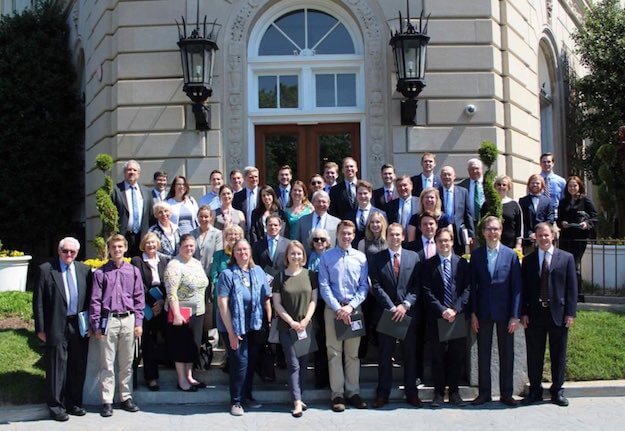
Over 80 Baltic Americans gathered in DC to advocate for the Baltics. Photo by Jonas Cyvas
Estonian Americans from Maryland, Virginia and Ohio joined over 80 Baltic Americans from across the U.S. on May 3rd for Baltic Advocacy Day 2018. The event was coordinated jointly by the American Latvian Association, American Latvian Youth Association, Joint Baltic American National Committee, Estonian American National Council, and Lithuanian American Council.
The group held meetings with over 50 Congressional offices representing 18 states to discuss issues important to the region. The day ended with panel discussions featuring experts on Russia sanctions and disinformation.
Participating constituents met largely with foreign relations and foreign affairs staffers in their Senators’ and Representative’s offices. Their discussions highlighted the importance of continued support for NATO’s presence in the region, implementation of sanctions against the Putin regime, combatting disinformation, and securing the region’s energy supplies. Participants also thanked the Senate offices for passing a resolution congratulating the Baltic nations on the centennials they are celebrating this year and asked their Representatives to support H.Res.826, a similar resolution working its way through the House. Senators and Representatives were also asked to consider joining the Senate Baltic Freedom and House Baltic Caucuses.
The afternoon panel event, in the Rayburn House Office Building, was titled Prescriptions for the Information War and Sanctions Policy and was standing room only. The first panel, on Using Sanctions to Force Change; Development, Implementation, and Enforcement Challenges in the Current Climate, included Latvian Member of Parliament and former ambassador to the U.S. Ojars Kalnins; Human Rights First Senior Vice President Rob Berschinski; and Kyle Parker, Chief of Staff for the U.S. Helsinki Commission. They highlighted the effectiveness of exposing corruption and human rights violators and agreed that sanctions should do harm to regimes and oligarchs, not ordinary citizens.
The second panel, Hostile Influences at Home and Abroad; Fighting State-Sponsored Disinformation, featured Vladimir Kara-Murza, Vice Chairman of Open Russia; Vineta Mekone of the NATO Strategic Communications Centre of Excellence in Latvia; and Brian Whitmore, Director of the Russia program at the Center for European Policy Analysis (CEPA) and author of the Power Vertical blog. They stressed the need to counter disinformation through truth and exposure of propagators, education of media consumers, and legal regulations against bots and other modern propaganda tools. The West should also do a better job of sharing the story of democracy, who we are, and what we stand for in terms that the target audience can relate to. Understanding how opposing messages are delivered and received is another important
aspect of creating an effective defense against disinformation. The panelists recognized the great work happening in the Baltics to address the issue and encouraged teamwork at all levels, from local engagement to national governments and NATO, to make a difference in addressing the problem.
Participants were resoundingly enthusiastic and satisfied with the day’s results. There was consensus that Baltic Advocacy Day should become an annual event. EANC thanks the organizers, panelists, participants and offices that made time to meet with us and for making it a successful day. We will keep our readers informed on next year’s event and what can be done in the meantime!
Karin Shuey
Washington, DC
Director Estonian American National Council










